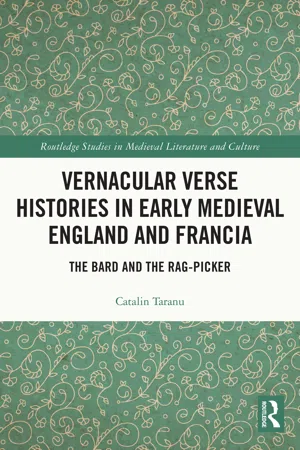1 Beyond Germanic Heroic Poetry
Poets, Historians, and the Gods of Our Fathers
In his Historiae adversus paganos, Orosius cites the historian Pompeius Trogus and his epitomizer Justin as his sources for Joseph’s prediction of the famine in Egypt. Justin and Pompeius were certainly considered to be historians by the standards of classical antiquity and thus also of the early medieval English elite for whom a translation was produced around 900 as part of King Alfred’s programme of vernacular learning.1 In the Old English (OE) translation, however, this standard establishment of textual authority is rendered rather unexpectedly as from ðæm Iosepe, Sompeius (sic!) se hæþena scop ond his cniht Iustinus wæran ðus singende: ‘the pagan poet [historicus in the original Latin text] Pompeius and his apprentice [breviator in the Latin] Justin were thus singing about Joseph’.2 In the same translation, Homer (poeta in the original Latin) is also called a scop, which coincides with the usual meaning of the word – ‘poet’.3
This detail has attracted little comment from scholars writing on the naturalization of this text for the early medieval English cultural landscape.4 But the greater import of this detail should not escape us: an elite, literate, early medieval English individual who was familiar enough with classical learning and the Latinate tradition of historiography to be able to translate Orosius did not think it improper to turn two sober historians from the classical past into a bard and his apprentice singing rather than writing their histories, just like the poet Homer presumably sang his epics. Are we simply seeing the translator nodding – is it an unthinking anachronism or perhaps an inside joke? Or is it rather an intentional attempt at naturalizing the persona of the historian from classical and classicizing history-writing by turning it into a vernacular figure with a specific socio-cultural function and narrative authority that pertained to the domains of both poetry and history-writing in the cultural horizon of early medieval England?
It is the latter possibility that illustrates my approach throughout this book, which consists of teasing out vernacular theories of historical representation, truthfulness, and narrative authority lying implicit in Germanic heroic verse written down in early medieval England and Francia and revealing how they performed cultural and emotional work for its different audiences. For, regardless of the actual intent behind this peculiar translation in Orosius, the mental image that it must have conjured for both the translator and audiences needs to be accounted for since it is certainly not a singular occurrence. The underlying conceptualization of narrating the past conforms to neither modern nor classical conceptual schemata of historical production: a historian is a particular type of poet, and history is verse made to be performed. We may surmise its grip on the cultural imagination of early medieval England (and of at least some communities in Francia) from the prevalence of this way of thinking about history-writing in texts such as Beowulf, The Battle of Maldon in England, or the Waltharius in Francia – all of them narrative representations of past events, however different both from each other and from more canonical history-writing, such as the Anglo-Saxon Chronicle (ASC) or Bede’s HE.
The Orosius translation is remarkable because it projects this conceptualization on the space of Latinate antiquity, even while the history-writing mode remains that of Orosius’s salvation-focussed classical historiography, albeit with plenty of changes meant to make the text perform ideological work for the newfound national entity of the Angelcynn in post-Alfredian England.5 For this reason, if we want to see this vernacular verse-centred mode of historical representation actually at work, we have to examine the corpus usually labelled ‘Germanic heroic poetry’ (henceforth referred to as ‘GHP’). Hence, in what follows, I argue that most GHP can be more productively situated within an ecology of cultural products that attempt to make sense of the past. This extended genre of history-writing includes, besides GHP, Latinate Christian histories (such as Bede’s or Gregory of Tours’s works), chronicles (the ASC, as well as Æthelweard’s Latinate adaptation of it), and biblical vernacular epics (such as the OE Genesis or Judith and the OS Heliand), without privileging any of them over history-writing in ‘heroic’ vernacular verse. Still, my book does not aim to provi...
